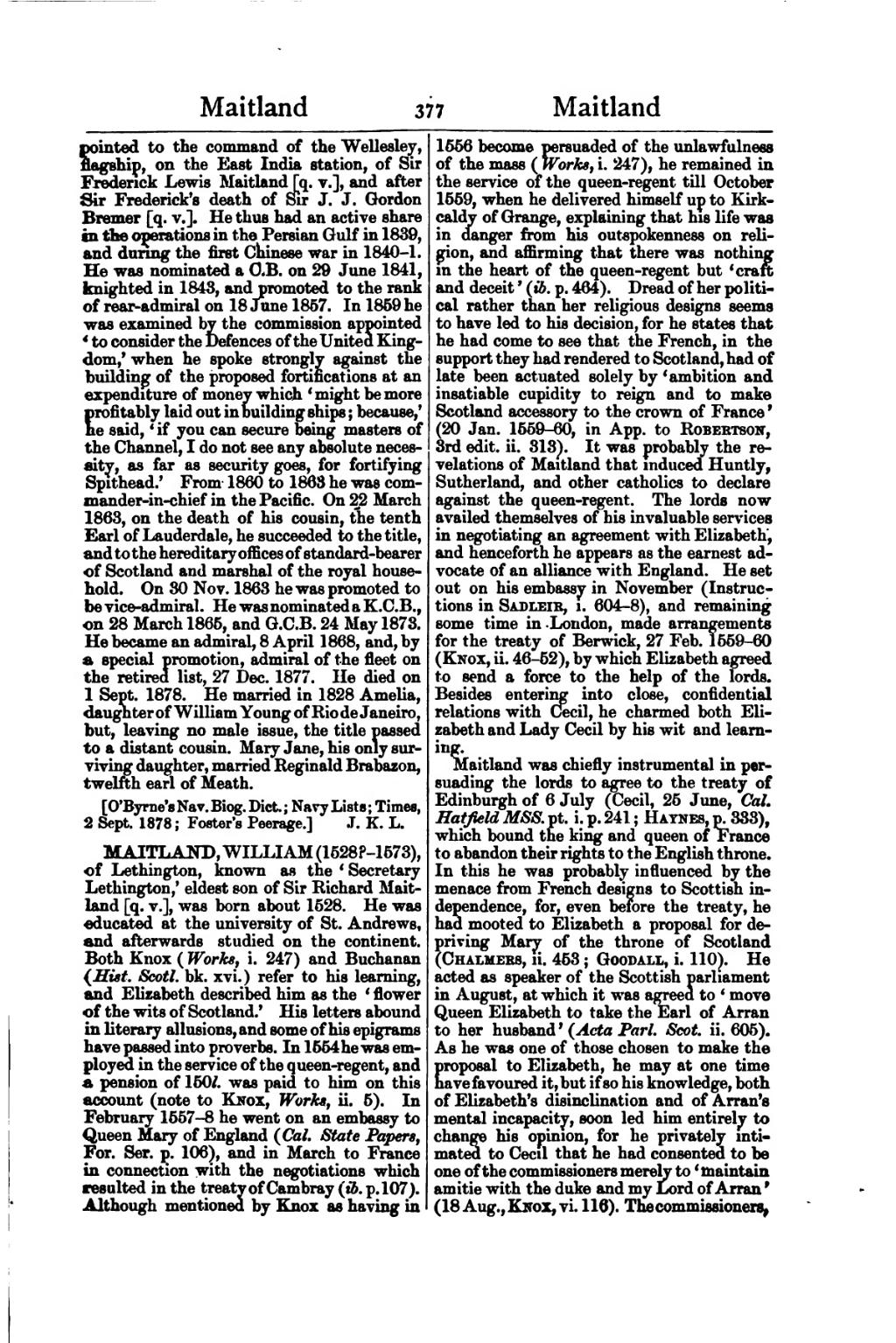pointed to the command of the Wellesley, flagship, on the East India station, of Sir Frederick Lewis Maitland [q. v.], and after Sir Frederick's death of Sir J. J. Gordon Bremer [q. v.]. He thus had an active share in the operations in the Persian Gulf in 1839, and during the first Chinese war in 1840-1. He was nominated a C.B. on 29 June 1841, knighted in 1843, and promoted to the rank of rear-admiral on 18 June 1857. In 1869 he was examined by the commission appointed 'to consider the Defences of the United Kingdom,' when he spoke strongly against the building of the proposed fortifications at an expenditure of money which 'might be more profitably laid out in building ships; because,' he said, 'if you can secure being masters of the Channel, I do not see any absolute necessity, as far as security goes, for fortifying Spithead.' From 1860 to 1863 he was commander-in-chief in the Pacific. On 22 March 1863, on the death of his cousin, the tenth Earl of Lauderdale, he succeeded to the title, and to the hereditary offices of standard-bearer of Scotland and marshal of the royal household. On 30 Nov. 1863 he was promoted to be vice-admiral. He was nominated a K.C.B., on 28 March 1866, and G.C.B. 24 May 1873. He became an admiral, 8 April 1868, and, by a special promotion, admiral of the fleet on the retired list, 27 Dec. 1877. He died on 1 Sept. 1878. He married in 1828 Amelia, daughter of William Young of Rio de Janeiro, but, leaving no male issue, the title passed to a distant cousin. Mary Jane, his only surviving daughter, married Reginald Brabazon, twelfth earl of Meath.
[O'Byrne's Nav. Biog. Dict.; Navy Lists; Times, Sept. 1878; Foster's Peerage.]
MAITLAND, WILLIAM (1528?–1573), of Lethington, known as the 'Secretary Lethington,' eldest son of Sir Richard Maitland [q. v.], was born about 1528. He was educated at the university of St. Andrews, end afterwards studied on the continent. Both Knox (Works, i. 247) and Buchanan (Hist. Scotl. bk. xvi.) refer to his learning, and Elizabeth described him as the 'flower of the wits of Scotland.' His letters abound in literary allusions, and some of his epigrams have passed into proverbs. In 1554 he was employed in the service of the queen-regent, and a pension of 150l. was paid to him on this account (note to Knox, (Works, ii. 6). In February 1557-8 he went on an embassy to Queen Mary of England (Cal. State Papers, For. Ser. p. 106), and in March to France in connection with the negotiations which resulted in the treaty of Cambray (ib. p. 107). Although mentioned by Knox as having in 1556 become persuaded of the unlawfulness of the mass (Works, i. 247), he remained in the service of the queen-regent till October 1559, when he delivered himself up to Kirkcaldy of Grange, explaining that his life was in danger from his outspokenness on religion, and affirming that there was nothing in the heart of the queen-regent but 'craft and deceit' (ib. p. 464). Dread of her political rather than her religious designs seems to have led to his decision, for he states that he had come to see that the French, in the support they had rendered to Scotland, had of late been actuated solely by 'ambition and insatiable cupidity to reign and to make Scotland accessory to the crown of France' (20 Jan. 1559-60, in App. to Robertson, 3rd edit. ii. 313]). It was probably the revelations of Maitland that induced Huntly, Sutherland, and other catholics to declare against the queen-regent. The lords now availed themselves of his invaluable services in negotiating an agreement with Elizabeth, and henceforth he appears as the earnest advocate of an alliance with England. He set out on his embassy in November (Instructions in Sadleir, i. 604-8), and remaining some time in London, made arrangements for the treaty of Berwick, 27 Feb. 1559-60 (Knox, ii. 46-52), by which Elizabeth agreed to send a force to the help of the lords. Besides entering into close, confidential relations with Cecil, he charmed both Elizabeth and Lady Cecil by his wit and learning.
Maitland was chiefly instrumental in persuading the lords to agree to the treaty of Edinburgh of 6 July (Cecil, 25 June, Cal. Hatfield MSS. pt. i. p. 241; Haynes, p. 333), which bound the king and queen of France to abandon their rights to the English throne. In this he was probably influenced by the menace from French designs to Scottish independence, for, even before the treaty, he had mooted to Elizabeth a proposal for deriving Mary of the throne of Scotland (Chalmers, ii. 453; Goodall, i. 110). He acted as speaker of the Scottish parliament in August, at which it was agreed to 'move Queen Elizabeth to take the Earl of Arran to her husband' (Acta Parl. Scot. ii. 606). As he was one of those chosen to make the proposal to Elizabeth, he may at one time have favoured it, but if so his knowledge, both of Elizabeth's disinclination and of Arran's mental incapacity, soon led him entirely to change his opinion, for he privately intimated to Cecil that he had consented to be one of the commissioners merely to 'maintain amitie with the duke and my Lord of Arran' (18 Aug., Knox, vi. 116). The commissioners,
